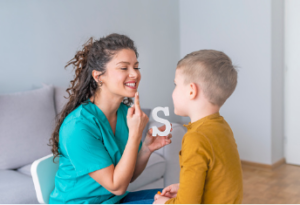Speech therapy for toddlers in Adelaide is vital to helping individuals improve their communication skills. Communication is conveying information using any means, including verbal (spoken), non-verbal (body language) and listening.
Your child may need to see a speech pathologist for various reasons. It is best to seek a referral from your GP or speak with your child and family health nurse. For professional speech therapy for toddlers Adelaide services, check this out.
Assessment
 If your child has speech and language difficulties, it may be appropriate for them to access speech pathology services. It is usually through a referral from their preschool or school. Children with Autism, Attention Deficit Disorder (ADHD/ ADD), Down Syndrome and other developmental delays may also be eligible to access services.
If your child has speech and language difficulties, it may be appropriate for them to access speech pathology services. It is usually through a referral from their preschool or school. Children with Autism, Attention Deficit Disorder (ADHD/ ADD), Down Syndrome and other developmental delays may also be eligible to access services.
A speech therapist conducts a comprehensive assessment and will work closely with you and your child to create a comfortable and supportive environment. The evaluation will assess all areas of communication, including articulation, phonology, language and fluency.
Maddy is warm and empathetic in her approach and believes challenges are a part of life, but you don’t have to go through them alone. She has experience in various alternative and augmentative communication techniques, including low-tech options such as photos, schedules and choice-making to high-tech solutions such as tablet technology with communication applications.
Therapy
We work with children and families to ensure their needs are met through various therapy approaches. We believe that communication and learning are integral to a child’s life. Our team of experienced speech pathologists are members of Speech Pathology Australia and are up to date with the latest research on children’s communication and learning challenges.
Homework
A child should say their first words by their first birthday, about ten words by 18 months and 50 words by two years (including two-word combinations). If a toddler isn’t saying these things or has difficulty following directions, answering questions or constructing sentences, and other children their age, it’s time to see a paediatric speech pathologist.
A therapist can teach parents how to do incidental teaching in their own homes so they can continue to work on their child’s goals between therapy sessions. It involves having them use cueing techniques in everyday activities, such as bathing or getting dressed.
Parents must get involved in their child’s therapy, as early intervention is the best way to improve a child’s communication skills. An excellent way to encourage this is by giving them fun homework tasks. Monthly rather than weekly homework packets can be a better way to engage parents, as it’s easier for them to manage. Weekly email check-ins can also be helpful to remind them of their child’s home assignments.
Parent Training
Several studies have shown that training parents to deliver DTTC impacts children’s speech and language. However, there are barriers to completing a home programme that may be particularly difficult for families living in rural and remote areas, and further high-quality research is required to investigate these issues.
At EarlyEd, we are pleased to offer the Hanen ‘More Than Words’ Program in small, personalized group sessions with a Hanen-certified speech pathologist. This program is available through the NDIS.
Kendal is a highly experienced Speech Pathologist who works with children across various age groups, including toddlers. She is passionate about improving a child’s quality of life through promoting positive communication and feeding skills. She has worked extensively in the disability sector with a broad knowledge of medical and behavioural diagnoses such as Global Developmental Delay, Cerebral Palsy and Sensory Processing Disorder. Her approach is holistic and family-centered. She has a strong focus on making therapy sessions fun. For professional speech therapy for toddlers Adelaide services, check this out.